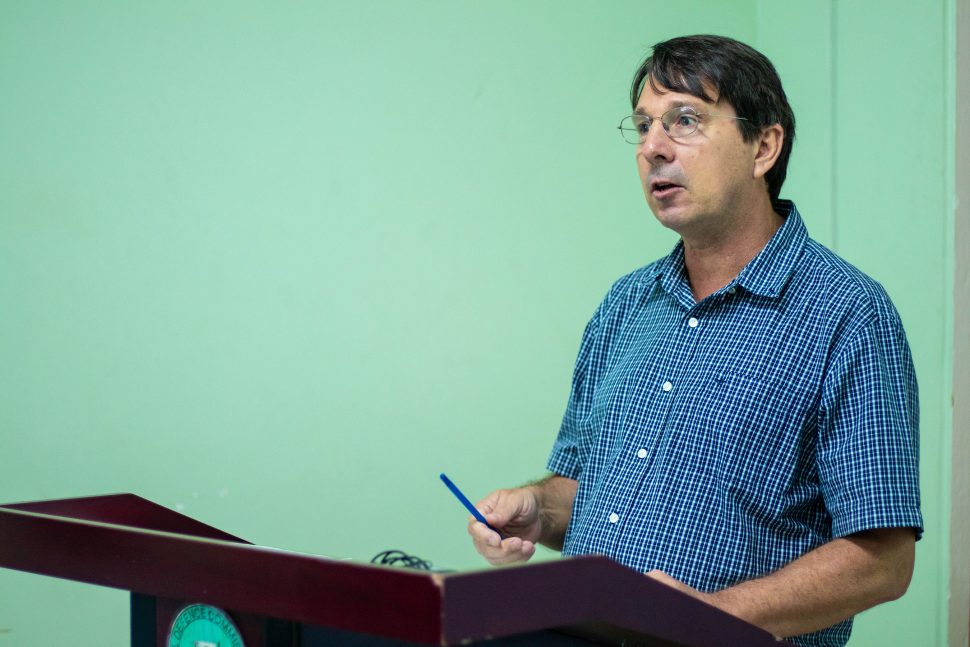With official figures showing over 4,000 Venezuelan migrants registered in Guyana, the local office of the United Nations Children’s Fund (UNICEF) has received some US$500,000 through its regional office to assist them and a sizeable amount of it will be used for water and sanitation in border communities, according to UNICEF Emergency Officer Ian Jones.
Jones, who was speaking to the media at annual review of the joint UNICEF and government annual work plan for last year, said emphasis is also being placed on integrating the migrant children into the school system. Since the crisis in their country, Venezuelans have been flooding neighbouring countries. Those who have come to Guyana have settled mostly in regions One and Seven.
UNICEF is part of the National Multi-Sectoral Coordinating Committee, which has been working to ensure that Venezuelan migrants are properly documented, vaccinated and provided for in terms of food and shelter.
The committee, which was established by President David Granger, is chaired by Citizenship Minister Winston Felix and includes representation from other ministries and international partners, such as the International Organization for Migration (IOM) and the Pan American Health Organization (PAHO).
The committee seeks to ensure that with each migrant helped, a resident of the host community is also assisted to help to build the community’s capacity to assist.
Jones said the 4,000 figure was reported at the committee’s recent fortnightly meeting and he noted that IOM has created a data tracking matrix from which they are getting some indications of whether migrants are officially registered or not. “But to have a concrete figure of the Venezuelan migrants who have actually come into the country, we are not really getting much beyond the official immigration figures,” he said.
Recently, the committee conducted a field assessment in Region One, where a number of communities were visited and meetings were held with migrants. Jones noted that the fact that the migrants do not come through the official entry points poses a difficulty in determining the actual emigration figures. Many of them make their way by canoes and it is only when areas where they have settled are visited by the immigration department that they are actually registered.
Jones pointed out that border communities are already quite stressed in terms of their capacities for access to water and sanitation and as a result a partnership has been formed with Guyana Water Incorporated (GWI) to supply water and cater for sanitation in seven of the communities in Region One and three in Region Seven.
He explained that they are not looking at traditional handouts where kits would be distributed but are instead focusing on building up capacities in the communities so that they could be better hosts, a process that will take a few more months.
Jones added that they also will have to focus on the sanitation aspect of the intervention and maintenance and this aspect is being done through the Guyana Red Cross and the Ministry of Public Health.
Meanwhile, Jones revealed that figures from the Ministry of Education show that about 150 children of migrants are in schools in Region One and there are 50 others who are in schools in Region Two. “It is not a case where they can be officially enrolled but they are accepted into the schools,” he noted.
In Region One, he said, the White Water Primary School, which was built to accommodate 170 students, is now catering to 214 and it is one of the regions that will receive support through the Ministry of Education to build the resilience of the schools in the border areas.
Because of the areas the migrants are settling can be easily overwhelmed, Jones said they are focusing on supporting the families and schools to be hosts. “We are not going to say, ‘Oh we are only going to get furniture for migrant children but we are also going to new furniture and support for the host community children,” he explained.
He noted that UNICEF works through its government partners and non-government partners, such as the Guyana Red Cross. “It is really through our programmatic partnerships, which we are now upscaling for the emergency response,” he added.





